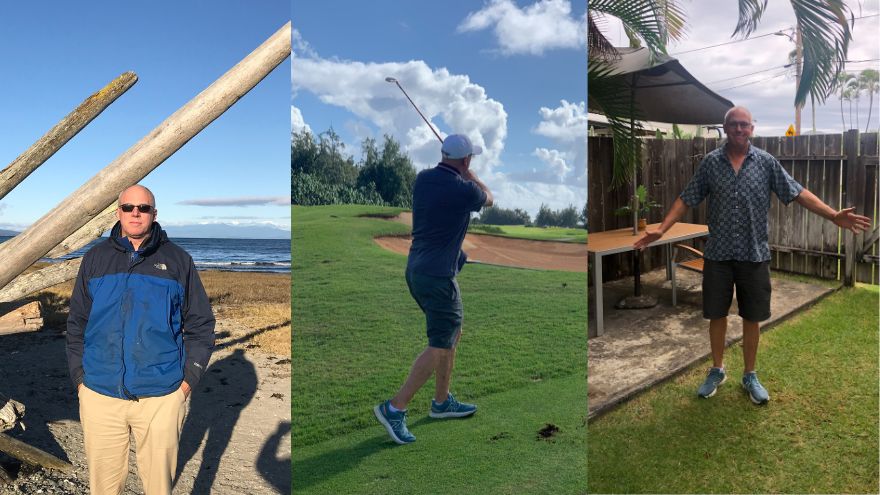Search
Results for 'urgent care'
Clear-
Hospice Care
Compassionate Care in the Comfort of Your Home When you or someone you love has a life-limiting illness and is ready to focus on comfort over treatment, it may be time to consider hospice. Hospice care is specialized care that provides physical comfort and emotional, social and spiritual support for those near the end of life. At Renown Hospice, we use a family-centered approach to provide quality of life care in the comfort of home. We know that the decision to pursue hospice is one of the most challenging times – please note our team is available 24/7 to answer any questions. The Renown Hospice Difference Renown Hospice is the only not-for-profit hospice in the region, founded on a mission to care for and support those in our community. We take the time to listen and respond to each patient’s own definition of quality of life and specific care needs. We’re proud to be one of the highest rated quality care and experience agencies in northern Nevada
-
Palliative and Supportive Care
Compassionate Care Palliative and Supportive Care provides specialized medical care for serious illnesses and diseases, including advanced kidney failure or heart disease. Palliative Care helps to: Prevent and relieve suffering to help build the best possible quality of life. Add value to standard therapies by assisting with advanced illness planning and symptom management. Palliative & Supportive Care may be needed if: You've had multiple hospital admissions for severe illness. Severe pain, nausea, fatigue or other symptoms impacting quality of life and you are reconsidering treatment plans. Treatments are no longer working. You're feeling hapless or discouraged about the future due to your serious illness. Talk to your doctor to find out if palliative care is the right choice for you or your family member. Your Care Team Your palliative care support team comprises doctors, nurses, chaplains, social workers and other specialists who work together with you to provide extra support. Your care team can help: Facilitate close communication between you and your physician team, as well as nurses and specialists. Offer medical assessments and symptom management to help reduce pain, nausea, fatigue, shortness of breath and anxiety. Improve the ability to tolerate medical treatments and fain the strength to live a productive daily life. Explain treatment options and the decision making process regarding care. Navigate the healthcare process. Lend emotional and spiritual support.
-
Advanced Wound Care
Renown Advanced Wound Care provides specialized treatment for wound healing, ostomy care and foot and nail care. Our team of certified nurses and physicians is uniquely qualified, experienced and dedicated to providing care for severe and chronic wounds.
-
Excellence in Heart Care Changes a Patient's Life
Being diagnosed with a chronic heart condition like atrial fibrillation (A-fib) can shift the course of your entire life. Embracing heart medications and lifestyle changes become your norm, and thanks to advancements in medicine and medical technology, managing the condition can bring you to a new sense of normalcy. But what if a different option was possible – one that would make medications and activity limits a thing of the past? This became the reality for Renown Health patient Richard Preyer after receiving a hybrid catheter ablation. Thanks to the vigilant surgical care of Shining Sun, MD, a cardiologist at the Renown Institute for Heart & Vascular Health, and his compassionate team, Richard has a new lease on life. Minimally Invasive with Maximal Results An A-fib patient since 2010 who had been living with an unfinished ablation, the 59-year-old Carson City resident turned to the internet to look for alternate solutions. He had heard that the Renown Institute for Heart & Vascular Health was a top-tier location for cardiovascular care. “I changed health insurance plans through Nevada Health Link to ensure I could see a Renown cardiologist,” said Richard. Choosing a cardiologist was an even easier decision for Richard. Dr. Sun’s introductory Find a Doctor video on Renown’s YouTube channel, where he displayed his expertise and determination, was more than enough for Richard to choose him as his cardiac care leader. At his first visit, Dr. Sun reviewed Richard’s records, and noted his prior unfinished ablation. The nine-hour procedure had been performed several years ago. With the enhanced technologies at Dr. Sun's disposal, Richard was excited at the thought of his life potentially being changed for good – with a minimally-invasive solution. Dr. Sun collaborated closely with Richard’s previous and current care teams – including a surgeon who performed a maze operation on him right before his surgery at Renown, to ensure his hybrid ablation was tailored uniquely to him. “Dr. Sun is clearly a very powerful cardiologist with many connections, and the coordination between his team and my other doctors was great,” said Richard. After working on the exterior of the heart in the first phase of the surgery and the interior of the heart during the second phase, Richard’s hybrid ablation was successful, completing the unfinished portion of his previous ablation. “Fixing A-fib can take one to three ablations, and sometimes it never holds,” said Richard. “That is one of the largest reasons why I am so thankful for this procedure and how it ended up.” Life After A-fib Now comes the long, arduous healing process, right? Not for Richard. With only eight incisions (four on each side of his chest), he was able to remove his bandages after two days, and he healed completely in one week. “I was even back to taking three-mile walks within a week of my operation,” said Richard. No more blood thinners. No more activity limits. And most importantly for Richard, no more heart-stabilizing medications that came with side effects he didn’t enjoy. He attributes his enhanced life to Dr. Sun and his team. “I highly recommend Dr. Sun and everyone that works with him,” he said. “Everyone in the group, from the nurses and anesthesiologists going above-and-beyond to the schedulers who helped me navigate the appointment process, made me have a lot of confidence. Their calm demeanors made so much difference.” Today, Richard now enjoys elongated walks in the northern Nevada outdoors, exotic vacations with his wife and, as he describes, “feeling like I’m in my 40’s again.” Learn more about the region's leader in cardiac health, heart and vascular care here.
Read More About Excellence in Heart Care Changes a Patient's Life
-
Structural Heart Program
The Renown Health Structural Heart Program was the first integrated program of its kind in northern Nevada. Since the beginning, we've been dedicated to providing specialized care to patients with complex and progressive structural heart and valve disease. Our team of experts offer comprehensive diagnostics, advanced treatment options, leading-edge technologies and top-level expertise.
-
Your Top 5 Questions about TAVR Answered
Your heart is the muscle in charge of pumping blood to your entire body. This vital organ is made up of chambers, valves and blood vessels. Your heart valves work similarly to a one-way door: they open and close, controlling blood flow in the correct direction through the heart chambers. For patients who have been diagnosed with a heart-related condition like aortic valve stenosis (narrowing), it is important to know treatment options. Most might think open-heart surgery is the only way to treat a heart valve, but many hospitals, including Renown, also offer a minimally invasive procedure called a Transcatheter Aortic Valve Replacement (TAVR). Dr. Abhilash Akinapelli of Renown Institute for Heart & Vascular Health shares his answers to the top five TAVR questions: 1. What causes aortic valve stenosis? Aortic valve stenosis can be caused by a variety of factors. The main reasons being wear and tear of the valve due to aging; genetically abnormal heart valve (bicuspid aortic valve); long-standing high blood pressure; and other reasons like radiation exposure. 2. Am I a candidate for TAVR? Renown’s heart care teams are made up of your primary care provider, cardiologist and cardio thoracic surgeon. They will evaluate if patients are a good candidate for the TAVR procedure by performing a variety of screenings and tests. Some of these include: Echocardiogram Electrocardiogram (ECG or EKG) Chest X-ray Exercise tests or stress tests Cardiac computerized tomography (CT) scan Cardiac catheterization 3. What are the advantages of the TAVR procedure? The Transcatheter Aortic Valve Replacement (TAVR) procedure is much less invasive than open heart surgery, otherwise known as a Surgical Aortic Valve Replacement (SAVR). Patients can typically return to their normal lifestyles within a week after leaving the hospital. During the TAVR procedure, a stent valve mounted on a balloon is advanced to the heart through the blood vessels in the groin without any incision. Once in position, the balloon will be inflated to firmly expand the new valve inside the diseased old valve, pushing it away to the sides. Once the new valve is in place, it begins working immediately and the deflated balloon is removed. The surgical procedure is approximately one hour long. Patients can get up and walk after four hours and will be discharged the following day if no complications arise. Compared to a SAVR, recovery time is much shorter and less risky for patients above the age of 75. A big advantage for anyone who fits under the criteria for a TAVR. 4. Is the procedure painful? The TAVR procedure is not surgery, but you will still be asleep during the procedure. Since no incision is made, it is essentially a painless procedure. Patients may experience slight discomfort such as aches and pains at the entry site of the catheter. 5. Can I have an MRI and X-rays done after having a TAVR valve? Yes, patients can have MRI scans and X-rays after TAVR. For further questions and information about the TAVR procedure, please consult with your Renown heart care team at 775-982-2452 or through MyChart.
-
11 Tips Caregivers Need to Know
Becoming a caregiver or playing a more active role in another’s healthcare is a big responsibility. At some point, almost all adults will support an aging parent or a loved one in need. Keeping track of their needs and wellbeing, while also prioritizing your own can become overwhelming. It’s important to know: you are not alone, and help is available. Read on for 11 tips to help you manage your time, your own wellbeing and your loved one’s care. Self-care comes first. When your main priority is the person in your life who needs care, it’s easy for your own needs to take the backseat. Give yourself time each day to focus on your personal wellbeing. It’s hard to give a loved one the care they need if your own needs are not met. Prioritize the Activities of Daily Living (ADL). Make a note of what ADLs your loved one can do alone, what they need help with and what activities require the most help. This will help you work through the day with them, as well as plan out how the day’s activities will go. Do a home safety audit. Do showers, bathtubs and steps have safety grab bars? Look around the house for additional tripping hazards, like rugs or electrical cords. If your loved one struggles with day-to-day navigation of the home, consider scheduling an occupational therapy appointment. This type of therapy helps a person develop or maintain the motions required to accomplish daily tasks. You might also qualify for a referral to in-home healthcare, such as Home Care. Have the hard conversation. The best time to discuss views about end of life care and to learn what choices are available is before a life-limiting illness or crisis occurs. With advance care planning, you can help reduce the doubt and anxiety related to decision making at the end of life. Completing an Advance Directive is a great tool to sort out all these decisions before they’re needed. Attend a free workshop to learn more and complete this important document. Identify when you need respite. Respite care involves receiving a short-term break from caregiving. Organizing in-home care for your loved one will allow you to step away and tend to your needs. By identifying what kind of respite care you are seeking, you can find the right person to provide you with that much-needed break. Don’t wait until you feel overwhelmed, plan ahead. Write down insurance contact information. Have a direct connection to the right insurance professional for support and advice. If your loved one is eligible Medicare, this is a good opportunity to review their current selections and if they would benefit from a Medicare Advantage Plan or Medicare Supplement Insurance. Seeking out expert advice or information on Medicare options is a great way to navigate this. Consider calling a broker, or attend a free educational seminar with Senior Care Plus. Gather legal and financial information. Make a list of all existing legal documents and financial accounts that your loved one has. These might include a will, advance directive, power of attorney, bank accounts or investment accounts. If you have questions about how to manage them, or need assistance in setting up additional framework, reach out to a lawyer, legal service, financial adviser or bank representative. Create an inventory of medical information. Identify where all of your loved one’s medical records are, as well as a list of providers or healthcare practices where they have received care. Consider if you should have your loved one give you Proxy Access in MyChart, which allows you to access all the features in MyChart on their behalf, including viewing upcoming appointments, viewing test results and emailing a doctor on their behalf. Make a list of what others can do. Think about all the little (and big) things that need to happen, and write down tasks that others could take care of you. When someone says “let me know what I can do” you’ll be ready with a pre-written list of items they may be able to assist with. Tasks could include tackling around-the-house repairs, scheduling lawn work, helping to walk the dog, taking a car for an oil change and cleaning. Find programs and events for social enjoyment. If and when possible, seek an activity outside of the home. Look for community centers that have programs for seniors, recreational activities or meals that you can patriciate in together. If leaving the home is not an option, arrange for visits or in-home activities, such as movie nights, card games or time to visit with family. Research long-term options. If you will be considering a nursing home or assisted living, make a list of amenities that you and the person you are caring for would like. Take this list with you when visiting potential locations to make sure you don’t forget to ask about each item.
-
Heart Surgery
Cardiothoracic Surgery Led by a team of three distinguished cardiac surgeons with over 40 years of combined experience, Renown Health's Cardiothoracic Surgery program is the top-ranked cardiothoracic surgery program in Nevada.
-
-
4Dec
This support group provides support, education, networking, and resource materials to caregivers coping with a loved one diagnosed with cancer. In effort to provide the most supportive atmosphere for those caring for loved one dealing with cancer, this group is for current cancer caregivers only. If you have lost a loved one to cancer, there are these groups available for support: Grief Support Groups in Reno If you have cancer, Renown offers the following support groups: Cancer Support Group Men’s Prostate Cancer Support Group Newly Diagnosed Breast Cancer Orientation Class Lymphedema Education & Risk Reduction Class * Virtual attendance is available. Link will be sent one day before meeting to email provided on registration.
Read More About Cancer Caregiver Support Group
-
-
-
29May
This support group provides support, education, networking, and resource materials to caregivers coping with a loved one diagnosed with cancer. In effort to provide the most supportive atmosphere for those caring for loved one dealing with cancer, this group is for current cancer caregivers only. If you have lost a loved one to cancer, there are these groups available for support: Grief Support Groups in Reno If you have cancer, Renown offers the following support groups: Cancer Support Group Men’s Prostate Cancer Support Group Newly Diagnosed Breast Cancer Orientation Class Lymphedema Education & Risk Reduction Class *Virtual attendance is available. Link is sent one day before the meeting to email provided on registration.
Read More About Cancer Caregiver Support Group
-








